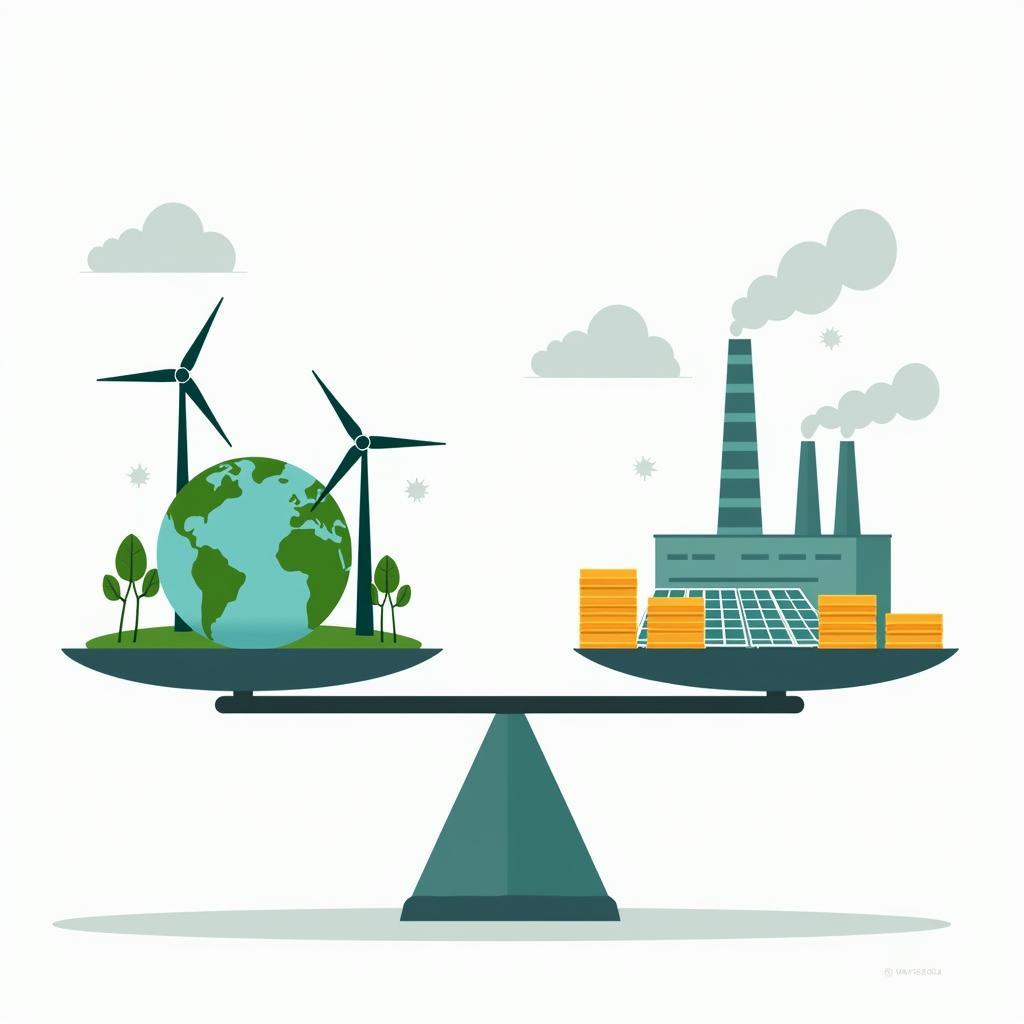Mở bài
Trong 10 năm trở lại đây, chủ đề năng lượng tái tạo, biến đổi khí hậu và môi trường xuất hiện thường xuyên trong đề thi IELTS Writing Task 2. Việc hiểu sâu “Why Renewable Energy Should Be A Global Priority” không chỉ giúp bạn viết đúng trọng tâm mà còn gia tăng cơ hội đạt band cao nhờ vốn từ học thuật, lập luận logic và ví dụ thực tiễn. Ở bài viết này, bạn sẽ học được: 3 bài mẫu hoàn chỉnh theo 3 mức band (5-6, 6.5-7, 8-9), phân tích chấm điểm chi tiết, danh sách từ vựng chủ chốt, 6 cấu trúc câu dễ ăn điểm và checklist tự đánh giá trước-khi-sau khi viết.
Một số đề thi thực tế liên quan đến năng lượng và môi trường đã xuất hiện gần đây:
- “Developing countries should focus on industrialization rather than environmental protection. To what extent do you agree or disagree?” (xuất hiện trên các nguồn tổng hợp đề thật)
- “Some people think that governments should invest more in public transport rather than in building new roads. To what extent do you agree or disagree?” (liên quan đến phát thải giao thông và năng lượng sạch)
- “Many people think that the best way to solve environmental problems is to increase the cost of fuel. To what extent do you agree or disagree?” (đề phổ biến trên các trang luyện thi lớn)
Trong bài, tôi sẽ chọn một đề tiêu biểu, sát với ý định tìm kiếm về why renewable energy should be a global priority, để phân tích chiến lược, viết bài mẫu và chấm điểm.
1. Đề Bài và Phân Tích
Some people argue that investing in renewable energy should be a global priority, while others believe countries should focus on their immediate economic needs. Discuss both views and give your own opinion.
Dịch đề:
Một số người cho rằng đầu tư vào năng lượng tái tạo nên là ưu tiên toàn cầu, trong khi những người khác tin rằng các quốc gia nên tập trung vào nhu cầu kinh tế trước mắt của họ. Hãy thảo luận cả hai quan điểm và đưa ra ý kiến của riêng bạn.
Phân tích đề bài:
- Dạng câu hỏi: Discuss both views and give your opinion (thảo luận hai chiều + nêu quan điểm).
- Yêu cầu:
- Trình bày lập luận cho cả hai phía: vì sao năng lượng tái tạo nên là ưu tiên toàn cầu; vì sao một số nước cần ưu tiên nhu cầu kinh tế trước mắt.
- Đưa ra quan điểm cá nhân rõ ràng và nhất quán.
- Thuật ngữ quan trọng:
- Renewable energy: năng lượng tái tạo (solar, wind, hydro, geothermal, biomass).
- Global priority: ưu tiên ở cấp độ toàn cầu (tức là có sự phối hợp quốc tế, chính sách, tài trợ xuyên biên giới).
- Immediate economic needs: nhu cầu kinh tế trước mắt (tăng trưởng GDP ngắn hạn, việc làm, cơ sở hạ tầng thiết yếu).
- Lỗi thường gặp của học viên Việt Nam:
- Lệch đề: chỉ nói chung về môi trường mà thiếu trọng tâm “ưu tiên toàn cầu”.
- Thiếu cân bằng khi “discuss both views”: viết quá thiên lệch, không phân tích vế phản biện.
- Ví dụ chung chung: nêu “ví dụ Việt Nam” nhưng không có chi tiết thuyết phục.
- Ngữ pháp: mạo từ (a/an/the), chia thì khi nói các xu hướng hiện tại và dự đoán tương lai, giới từ (invest in, priority for/of).
- Cách tiếp cận chiến lược:
- Mở bài nêu bối cảnh: khí hậu, chi phí năng lượng, an ninh năng lượng.
- Thân bài 1: Lợi ích và lý do tại sao nên coi năng lượng tái tạo là ưu tiên toàn cầu (khí hậu, sức khỏe, an ninh năng lượng, đổi mới công nghệ, hợp tác quốc tế).
- Thân bài 2: Nêu quan điểm đối lập: áp lực ngân sách, nghèo đói, nhu cầu tạo việc làm nhanh; sau đó phản biện có điều kiện: cơ chế tài chính quốc tế, chuyển giao công nghệ, lộ trình pha trộn.
- Kết luận: Khẳng định quan điểm, đề xuất giải pháp cân bằng.
 Biểu đồ so sánh trực quan giữa việc đầu tư năng lượng tái tạo và nhu cầu kinh tế trước mắt cho bài IELTS.
Biểu đồ so sánh trực quan giữa việc đầu tư năng lượng tái tạo và nhu cầu kinh tế trước mắt cho bài IELTS.
2. Bài mẫu Band 8-9
Giới thiệu: Bài Band 8-9 có lập luận sâu, dẫn chứng chọn lọc, liên kết chặt chẽ, từ vựng chính xác và đa dạng, lỗi ngữ pháp tối thiểu. Độ dài 280-320 từ.
Essay:
While short-term economic pressures are undeniable, making renewable energy a global priority is both pragmatic and principled. On the one hand, critics contend that developing nations must first expand industries that yield rapid GDP growth and jobs. On the other, a coordinated transition to clean power can, in fact, safeguard prosperity and stability in the long run.
Admittedly, governments facing budget constraints often prioritise infrastructure that delivers immediate returns. Building roads or subsidising fossil-fuel power plants may appear cheaper and faster, particularly where energy demand is surging. Moreover, households living near the poverty line understandably seek affordable electricity rather than abstract climate targets. These considerations explain why some leaders view decarbonisation as a luxury for wealthier countries.
However, treating renewables as secondary is a costly misconception. First, renewable energy enhances energy security by diversifying supply and insulating nations from volatile fuel prices. Second, the health benefits of cleaner air—fewer respiratory diseases and reduced healthcare burdens—translate into measurable productivity gains. Third, green industries catalyse innovation, unlocking high-quality employment in manufacturing, installation, and maintenance. Crucially, the “global priority” lens enables shared financing, technology transfer, and standards that accelerate the transition for low- and middle-income countries. With instruments such as blended finance and just-transition funds, poorer nations can adopt renewables without compromising development goals.
 Hình ảnh minh họa công nghệ xanh năng lượng tái tạo đang xúc tác đổi mới và tạo ra việc làm chất lượng cao.
Hình ảnh minh họa công nghệ xanh năng lượng tái tạo đang xúc tác đổi mới và tạo ra việc làm chất lượng cao.
In my view, the dichotomy between growth and green power is false. Policymakers should design sequenced roadmaps: stabilise essential services, then scale renewables through grid upgrades, storage, and demand management. Where interim fossil capacity is unavoidable, strict emissions caps and sunset clauses can prevent lock-in. If countries cooperate on research, supply chains, and carbon pricing, the clean-energy transition becomes not a burden but a catalyst for inclusive growth.
Ultimately, prioritising renewables globally is the most economical way to protect public health, climate stability, and long-run competitiveness.
Phân tích Band điểm
| Tiêu chí | Band | Nhận xét |
|---|---|---|
| Task Response (Hoàn thành yêu cầu) | 8.5 | Trả lời đầy đủ hai quan điểm và nêu ý kiến rõ ràng. Lập luận có chiều sâu, có giải pháp cụ thể như blended finance, sunset clauses. Không lan man. |
| Coherence & Cohesion (Mạch lạc & Liên kết) | 8.0 | Bố cục logic; mỗi đoạn có câu chủ đề rõ. Dùng từ nối tinh tế (Admittedly, However, Ultimately). Liên kết ý xuyên suốt, không lặp từ quá mức. |
| Lexical Resource (Từ vựng) | 8.5 | Từ vựng học thuật đa dạng và chính xác: decarbonisation, insulating from volatility, catalyse innovation, just-transition funds. Collocations tự nhiên. |
| Grammatical Range & Accuracy (Ngữ pháp) | 8.0 | Nhiều cấu trúc phức, mệnh đề quan hệ, cụm phân từ, câu điều kiện. Gần như không có lỗi; dấu phẩy dùng hợp lý, kiểm soát tốt thì. |
Các yếu tố giúp bài này được chấm điểm cao
- Triển khai hai chiều cân bằng trước khi chốt quan điểm cá nhân.
- Dùng bằng chứng chính sách cụ thể (finance, technology transfer) thay vì khẩu hiệu.
- Collocations tự nhiên: energy security, volatile fuel prices, high-quality employment.
- Cấu trúc câu linh hoạt: mệnh đề nhượng bộ, đảo ngữ nhẹ qua trật tự nhấn.
- Phản biện quan điểm đối lập với giải pháp “sequenced roadmaps”.
- Từ ngữ định lượng hợp lý (long-run, interim, measurable), tránh sáo rỗng.
- Sự mạch lạc được dẫn dắt bởi câu chủ đề mạnh và kết đoạn kết nối chặt.
3. Bài mẫu Band 6.5-7
Giới thiệu: Bài Band 6.5-7 có ý rõ ràng, lập luận hợp lý, từ vựng khá đa dạng nhưng đôi khi lặp và chưa tinh tế. Có thể có một vài lỗi nhỏ nhưng không gây hiểu nhầm.
Essay:
Some people believe renewable energy should be treated as a global priority because climate change affects every country, while others say nations must deal with urgent economic needs first. This essay will discuss both sides and explain why a balanced pathway is realistic.
Those who prioritise the economy argue that rapid industrial growth creates jobs, raises tax revenue, and reduces poverty. For low-income countries, building coal or gas plants may deliver electricity faster and cheaper than wind or solar. In addition, governments need funds for hospitals, schools, and roads, so they hesitate to invest in technologies that require high upfront costs and complex grid upgrades.
However, there are strong reasons why renewables deserve global attention. Firstly, clean energy reduces air pollution, which can lower healthcare spending and improve productivity. Secondly, renewable sources make countries less dependent on imported fuels, protecting them from price spikes and supply disruptions. Finally, when the international community treats clean energy as a shared priority, it can provide financial support and technology transfer, helping poorer nations adopt these solutions sooner.
In my opinion, countries should not choose between development and decarbonisation. A practical approach is to set short-term goals for reliable power while planning medium-term investments in solar, wind, and storage. If international lenders offer lower interest loans and training, the transition becomes more affordable. Therefore, renewable energy should be promoted globally, but with flexibility for countries at different stages of development.
Phân tích Band điểm
| Tiêu chí | Band | Nhận xét |
|---|---|---|
| Task Response (Hoàn thành yêu cầu) | 7.0 | Trả lời đúng dạng “discuss both views + opinion”, có lập luận và ví dụ khái quát. Thiếu một số chi tiết sắc sảo so với Band 8-9. |
| Coherence & Cohesion (Mạch lạc & Liên kết) | 7.0 | Bài chia đoạn rõ, ý triển khai theo trình tự hợp lý. Từ nối dùng quen thuộc, đôi chỗ lặp cấu trúc. |
| Lexical Resource (Từ vựng) | 6.5 | Từ vựng học thuật đủ dùng (upfront costs, technology transfer), nhưng còn lặp và chưa có nhiều collocations nâng cao. |
| Grammatical Range & Accuracy (Ngữ pháp) | 7.0 | Câu phức vừa phải, lỗi nhỏ không gây hiểu nhầm. Cần thêm đa dạng về cấu trúc để nâng band. |
So sánh với bài Band 8-9
- Band 8-9 có ví dụ chính sách cụ thể (blended finance, sunset clauses); Band 6.5-7 dừng ở khái quát (lower interest loans).
- Từ vựng Band 8-9 đa dạng và chính xác hơn; Band 6.5-7 đôi khi lặp từ.
- Cấu trúc câu của Band 8-9 linh hoạt hơn, có nhượng bộ, quan hệ, phân từ; Band 6.5-7 thiên về câu phức cơ bản.
4. Bài mẫu Band 5-6
Giới thiệu: Bài Band 5-6 có ý tưởng phù hợp nhưng phát triển chưa sâu; lỗi từ vựng/ngữ pháp xuất hiện tương đối; mạch lạc còn yếu.
Essay:
Many people say renewable energy must be the world main priority, but other people think countries should focus on economic problems first. I think both arguments have points, but I will explain why clean energy is important and also why money issues cannot be ignored.
On one hand, governments in poor countries need quick results. They want more factories and cheap electricity, so they can create jobs and reduce poverty. Building coal plants sometimes is faster and not expensive in the beginning. Also, people need hospitals and roads now, so it is hard to spend huge budgets on new technologies that are not always stable.
On the other hand, renewable energy has benefits for the future. It can reduce pollution and make the air more clean. It also help countries to not depend on imported fuel, which can be very expensive when prices change. If the world make this a global priority, rich countries can support poor ones with money and knowledge to build solar and wind.
In conclusion, I believe we should try both things together. First, make sure people have power and basic services. After that, invest more in renewables step by step. This is not easy, but it is better than choosing only economy or only environment.
Phân tích Band điểm
| Tiêu chí | Band | Nhận xét |
|---|---|---|
| Task Response (Hoàn thành yêu cầu) | 6.0 | Trả lời đúng đề và có ý kiến. Lập luận còn chung chung, thiếu chiều sâu và ví dụ cụ thể. |
| Coherence & Cohesion (Mạch lạc & Liên kết) | 5.5 | Liên kết đơn giản, lặp cấu trúc; từ nối cơ bản; một số câu chuyển ý chưa mượt. |
| Lexical Resource (Từ vựng) | 5.5 | Từ vựng đơn giản, lặp nhiều (cheap, important, not expensive). Một số collocations chưa tự nhiên. |
| Grammatical Range & Accuracy (Ngữ pháp) | 5.5 | Nhiều lỗi ngôi – số ít/số nhiều, mạo từ, chia động từ; câu phức hạn chế. |
Những lỗi sai của bài – phân tích & giải thích
| Lỗi sai | Loại lỗi | Sửa lại | Giải thích |
|---|---|---|---|
| “the world main priority” | Mạo từ + sở hữu | “the world’s main priority” | Thiếu ’s sở hữu; cần the vì xác định. |
| “Building coal plants sometimes is faster” | Trật tự trạng từ | “Building coal plants is sometimes faster” | Trạng từ “sometimes” nên đứng trước động từ chính. |
| “make the air more clean” | Collocation | “make the air cleaner” | So sánh hơn của tính từ: cleaner; collocation tự nhiên. |
| “It also help countries” | Chia động từ | “It also helps countries” | Chủ ngữ số ít “It” → “helps”. |
| “If the world make this a global priority” | Chia động từ | “If the world makes this a global priority” | “world” số ít, động từ chia “makes”. |
| “support poor ones with money and knowledge” | Từ vựng chưa tự nhiên | “provide finance and technology transfer to poorer nations” | Collocation học thuật phù hợp ngữ cảnh. |
Cách Cải Thiện Từ Band 6 Lên Band 7
- Bổ sung ví dụ cụ thể: tác động đến chi phí y tế, giá nhiên liệu, việc làm xanh.
- Nâng cấp từ vựng và collocations: energy security, upfront capital, grid integration, price volatility.
- Đa dạng cấu trúc câu: mệnh đề nhượng bộ (Although/While), mệnh đề quan hệ, cụm phân từ.
- Giảm lặp từ; dùng paraphrase thông minh (cheap → cost-effective/affordable; important → pivotal/central).
- Kiểm soát lỗi cơ bản: mạo từ, số ít/số nhiều, chia thì.
5. Từ vựng quan trọng cần nhớ
| Từ/Cụm từ | Loại từ | Phiên âm | Nghĩa tiếng Việt | Ví dụ (English) | Collocations |
|---|---|---|---|---|---|
| renewable energy | n. | /rɪˈnuːəbl ˈɛnərdʒi/ | năng lượng tái tạo | Renewable energy can enhance energy security. | renewable energy mix |
| decarbonisation | n. | /diːˌkɑːbənaɪˈzeɪʃn/ | khử carbon | Decarbonisation requires long-term planning. | deep decarbonisation |
| energy security | n. | /ˈɛnərdʒi sɪˈkjʊərəti/ | an ninh năng lượng | Solar power improves energy security. | enhance/undermine energy security |
| price volatility | n. | /praɪs ˌvɒləˈtɪləti/ | biến động giá | Renewables shield economies from price volatility. | shield from volatility |
| upfront costs | n. | /ˌʌpˈfrʌnt kɒsts/ | chi phí ban đầu | Upfront costs can be offset by long-term savings. | high/considerable upfront costs |
| grid integration | n. | /ɡrɪd ˌɪntɪˈɡreɪʃn/ | tích hợp lưới điện | Storage improves grid integration of wind energy. | improve/facilitate grid integration |
| technology transfer | n. | /tɛkˈnɒlədʒi ˈtrænsfɜːr/ | chuyển giao công nghệ | Funding should support technology transfer. | effective technology transfer |
| blended finance | n. | /ˈblɛndɪd faɪˈnæns/ | tài chính pha trộn | Blended finance can de-risk projects. | mobilise blended finance |
| just transition | n. | /dʒʌst trænˈzɪʃn/ | chuyển dịch công bằng | Policies must ensure a just transition for workers. | ensure a just transition |
| long-run competitiveness | n. | /lɒŋ rʌn kəmˌpɛtɪˈtɪvnəs/ | năng lực cạnh tranh dài hạn | Clean tech builds long-run competitiveness. | build/undermine competitiveness |
| to insulate from | v. | /ˈɪnsjʊleɪt frɒm/ | bảo vệ khỏi | Renewables can insulate economies from shocks. | insulate from shocks |
| to catalyse innovation | v. | /ˈkætəlaɪz ˌɪnəˈveɪʃn/ | xúc tác đổi mới | Public investment catalyses innovation. | catalyse private investment |
| moreover | linker | /mɔːˈrəʊvə/ | hơn nữa | Moreover, health benefits are significant. | moreover, furthermore |
| on the other hand | linker | /ɒn ði ˈʌðə hænd/ | mặt khác | On the other hand, budgets are tight. | contrast marker |
| affordable vs. cost-effective | adj. | /əˈfɔːdəbl/ vs /ˌkɒst ɪˈfɛktɪv/ | phải chăng vs. hiệu quả chi phí | Solar is affordable and cost-effective. | highly cost-effective |
Lưu ý phát âm: nhấn đúng trọng âm decarbonisation, volatility, integration.
 Một học viên IELTS đang chăm chỉ luyện viết và học từ vựng về chủ đề năng lượng tái tạo toàn cầu.
Một học viên IELTS đang chăm chỉ luyện viết và học từ vựng về chủ đề năng lượng tái tạo toàn cầu.
6. Cấu trúc câu dễ ăn điểm cao
-
Câu phức với mệnh đề phụ thuộc
- Công thức: Mệnh đề chính + while/although/whereas + mệnh đề phụ.
- Ví dụ từ bài Band 8-9: “While short-term economic pressures are undeniable, making renewable energy a global priority is both pragmatic and principled.”
- Vì sao ghi điểm: Tạo đối lập tinh tế, thể hiện kiểm soát ngữ pháp cao.
- Ví dụ bổ sung:
- Although upfront costs are high, life-cycle savings are substantial.
- Whereas coal is dispatchable, storage can increasingly bridge variability.
- Lỗi thường gặp: Dùng “despite” + mệnh đề (sai); đúng: despite + noun/gerund.
-
Mệnh đề quan hệ không xác định (non-defining relative clause)
- Công thức: Danh từ, which/who + mệnh đề bổ sung, …
- Ví dụ: “green industries catalyse innovation, unlocking high-quality employment, which benefits local communities.”
- Vì sao ghi điểm: Bổ nghĩa giàu thông tin, nhịp câu tự nhiên.
- Ví dụ bổ sung:
- These funds, which lower capital costs, accelerate deployment.
- The grid, which is already stretched, needs urgent upgrades.
- Lỗi thường gặp: Quên dấu phẩy; dùng “that” thay “which” trong non-defining.
-
Cụm phân từ (participle phrases)
- Công thức: V-ing/V-ed + cụm, dùng để rút gọn mệnh đề.
- Ví dụ: “Building roads or subsidising fossil-fuel power plants may appear cheaper and faster, particularly where energy demand is surging.”
- Vì sao: Nén thông tin, tăng tính học thuật.
- Ví dụ bổ sung:
- Reducing air pollution, governments can cut healthcare costs.
- Driven by global cooperation, the transition can speed up.
- Lỗi thường gặp: Treo chủ ngữ (dangling participle) làm mơ hồ.
-
Câu chẻ (Cleft sentences)
- Công thức: It is/was + X + that/who + mệnh đề.
- Ví dụ: “It is a coordinated transition that can safeguard prosperity and stability.”
- Vì sao: Nhấn mạnh điểm trọng tâm, tăng sức thuyết phục.
- Ví dụ bổ sung:
- It is international finance that enables poorer nations to adopt renewables.
- It is grid modernisation that unlocks large-scale solar.
- Lỗi thường gặp: Dùng “that” sai; nhầm thì.
-
Câu điều kiện nâng cao
- Công thức: If + hiện tại đơn, … can/may/might + V; hoặc If + quá khứ đơn, … would + V (giả định).
- Ví dụ: “If countries cooperate on research, the transition becomes a catalyst for inclusive growth.”
- Vì sao: Thể hiện lập luận giả định, định hướng chính sách.
- Ví dụ bổ sung:
- If capital costs were lower, adoption would accelerate.
- If carbon pricing is consistent, investors will respond.
- Lỗi: Dùng thì không thống nhất; quên “would” trong mệnh đề chính giả định.
-
Đảo ngữ để nhấn mạnh
- Công thức: Not only + trợ động + S + V, but also…
- Ví dụ: “Not only does renewable energy enhance security, but it also drives innovation.”
- Vì sao: Nhấn mạnh lập luận, tạo hiệu ứng hùng biện.
- Ví dụ bổ sung:
- Rarely has energy policy been so globally coordinated.
- Hardly ever do prices remain stable without diversification.
- Lỗi: Sai trợ động; quên đảo trợ động trước chủ ngữ.
7. Checklist Tự Đánh Giá
- Trước khi viết:
- Xác định dạng câu hỏi (agree/disagree, discuss both, advantages/disadvantages…).
- Gạch đầu dòng 2-3 luận điểm chính mỗi bên.
- Chọn ví dụ cụ thể, tránh chung chung.
- Trong khi viết:
- Mở bài rõ ràng: paraphrase đề + câu luận điểm.
- Mỗi thân bài: 1 ý chính + giải thích + ví dụ/logic + kết nối về luận điểm.
- Dùng từ nối đa dạng; hạn chế lặp từ khóa.
- Sau khi viết:
- Soát mạo từ (a/an/the), số ít/số nhiều, chia thì.
- Kiểm tra collocations và prepositions (invest in, priority for, dependence on).
- Loại bỏ câu dư/ý trùng; đảm bảo 260-320 từ.
- Mẹo quản lý thời gian:
- 3-4 phút đọc đề, lập dàn ý.
- 25-27 phút viết thân bài trước, rồi mở-kết.
- 4-5 phút soát lỗi và tối ưu từ vựng.
Kết bài
Chủ đề why renewable energy should be a global priority không chỉ giúp bạn thể hiện vốn từ học thuật về môi trường, năng lượng và kinh tế mà còn rèn kỹ năng lập luận hai chiều, rất phù hợp với IELTS Writing Task 2. Hãy luyện theo ba bài mẫu theo từng band, phân tích điểm mạnh-yếu, rồi áp dụng 6 cấu trúc câu ăn điểm để cải thiện đồng đều bốn tiêu chí chấm. Lộ trình thực tế: 2-3 tuần luyện theo chủ đề, mỗi tuần 2-3 bài, nhận phản hồi từ bạn học hoặc giáo viên, bạn có thể nâng 0.5 band một cách vững chắc.
Bước tiếp theo: chọn một đề tương tự, viết trong 35-38 phút, dùng checklist ở mục 7 để tự đánh giá, rồi đăng bài lên cộng đồng học tập để nhận góp ý. Tài nguyên bổ sung: từ vựng chủ đề, các collocations học thuật, danh sách cấu trúc câu ở trên. Hãy kiên trì, viết đều, và quan sát tiến bộ qua từng bản thảo. Khi bạn nắm chắc tư duy lập luận và từ vựng trọng tâm xoay quanh why renewable energy should be a global priority, việc tăng band sẽ trở nên khả thi và bền vững.



[…] Để hiểu bối cảnh rộng hơn của chủ đề năng lượng tái tạo, bạn có thể tham khảo bài viết nền tảng về định hướng toàn cầu tại liên kết: Đối với những ai quan tâm đến why renewable energy should be a global priority, nội dung này sẽ hữu ích: https://vn.ielts.net/why-renewable-energy-should-be-a-global-priority/ […]
[…] Để nhìn bức tranh tổng thể về chính sách và mục tiêu toàn cầu, bạn có thể tham khảo why renewable energy should be a global priority: https://vn.ielts.net/why-renewable-energy-should-be-a-global-priority/ […]